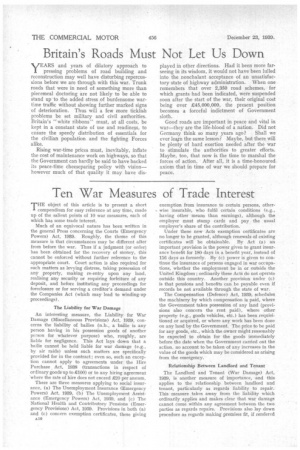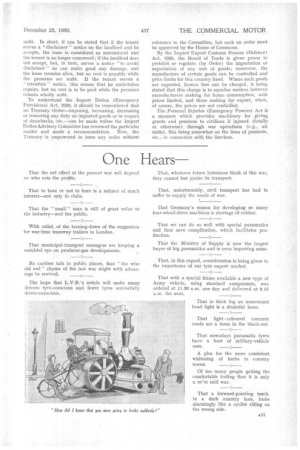Ten War Measures of Trade Interest
Page 12

Page 13

If you've noticed an error in this article please click here to report it so we can fix it.
THE object of this article is to present a short compendium for easy reference at any time, made up of the salient points of 10 war measures, each of which has some trade interest.
Much of an equivocal nature has been written in the general Press concerning the Courts (Emergency Powers) Act, 1939. Roughly, the theme of this measure is that circumstances may be different after from before the war. Thus if a judgment (or order) has been obtained for the recovery of money, this cannot be enforced without further reference to the appropriate court. Court action is also required for such matters as levying distress, taking possession of any property, making re-entry upon any land, realising any security or requiring forfeiture of any deposit, and before instituting any proceedings for foreclosure or for serving a creditor's demand under the Companies Act (which may lead to winding-up proceedings).
The Liability for War Damage
An interesting measure, the Liability for War Damage (Miscellaneous Provisions) Act, 1930, concerns the liability of bailies (n.b., a bailie is any person having in his possession goods of another person for whatever purpose) who, roughly, are liable for negligence. This Act lays down that a bailie cannot be held liable for war damage (e.g., by air raids) unless such matters are specifically provided for in the contract ; even so, such an exception cannot apply to agreements under the Hire Purchase Act, 1938 (transactions in respect of ordinary goods up to £100) or to any hiring agreement "where the rate of hire does not exceed 220 per annum.
There are three measures applying to social insurance, (a) The Unemployment Insurance (Emergency Powers) Act, 1939, (b) The Unemployment Assistance (Emergency Powers) Act, 1939, and (c) The National Health and Contributory Pensions (Emergency Provisions) Act, 1930. Provisions in both (a) and (c) concern exemption certificates, these giving exemption from insurance to certain persons, otherwise insurable, who fulfil certain conditions (e.g., having other means than earnings), although the employer must stamp cards and pay the usual employer's share of the contribution.
Under these new Acts exemption certificates are no longer to be granted, although renewals of existing certificates will be obtainable. By Act (a ) an important provision is the power given to grant insurance benefit for 180 days in a benefit year, instead of 150 days as formerly. By (c) power is given to continue the insurance of persons engaged in war occupations, whether the employment be in or outside the United Kingdom ; ordinarily these Acts do not operate outside this country. Another provision under (c) is that pensions and benefits can be payable even if records be not available through the state of war.
The Compensation (Defence) Act, 1939, schedules the machinery by which compensation is paid, where the Government takes possession of any land (provisions also concern the rent paid), where other property (e.g., goods vehicles, etc.) has been requisitioned or acquired, or where any work has been done on any land by the Government. The price to be paid for any goods, etc., which the owner might reasonably be expected to obtain for the goods immediately before the date when the Government carried out the action, no account to be taken of any increases in the value of the goods which may be considered as arising from the emergency.
Relationship Between Landlord and Tenant The Landlord and Tenant (War Damage) Act, 1939, is another measure of importance, and this applies to the relationship between landlord and tenant, particularly as regards liability to repair. This measure takes away from the liability which ordinarily applies and makes clear that war damage cannot come within any agreement between the two parties as regards repairs. Provisions also lay down procedure as regards making premises fit, if rendered unfit. In short, it can be stated that if the tenant serves a " disclaimer " notice on the landlord and he, accepts, the lease is considered as surrendered and the tenant is no longer concerned; if the landlord does not accept, but, in turn, serves a notice "to avoid disclaimer" he can make good any damage, and the lease remains alive, but no rent is payable while the premises are unfit. If the tenant serves a " retention" notice, this means that he undertakes repairs, but no rent is to be paid while the premises remain wholly unfit.
To understand the Import Duties (Emergency Provisions) Act, 1939, it should be remembered that no Treasury Order—imposing, increasing, decreasing or removing any duty on imported goods or in respect of drawbacks, etc.—can be made unless the Import Duties Advisory Committee has reviewed the particular matter and made a recommendation. Now, the Treasury is empowered to issue any order without reference to the Committee, but such an order must be approved by the House of Commons.
By the Import Export %Customs Powers (Defence) Act, 1939, the Board of Trade is given power to prohibit or regulate (by Order) the importation of exportation of any sort of goods; moreover, the manufacture of certain goods can be controlled and price limits for this country fixed. Where such goods are exported, licence fees canbe charged, it being stated that this charge is to equalise matters between manufacturers making for home consumption, with prices limited, and those making for export, when, of course, the prices are not controlled.
The ,Personal Injuries (Emergency Powers) Act is a measure which provides machinery for giving. grants and pensions to civilians if injured (fatally or otherwise) through war operations (e.g., air raids), this being somewhat on the lines of pensions, etc., in connection with the Services.




















































